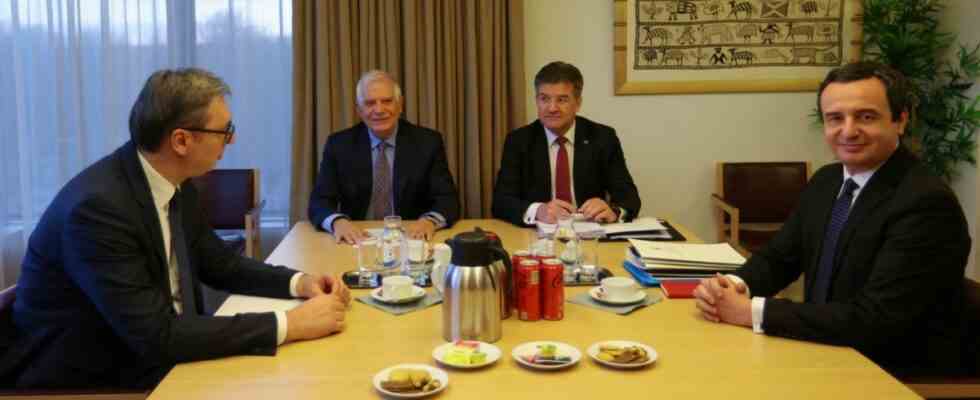The mere fact that the two politicians sat down together at the same table could already be considered a success of Western diplomacy. Aleksandar Vučić, the President of Serbia, and Albin Kurti, the Prime Minister of neighboring Kosovo, have missed few opportunities recently to show their mutual distrust and stoke tensions at the border. The meeting in Brussels, for which they gathered on Monday, was the result of a long and intensive push, mainly from Berlin and Paris.
And it worked – at least halfway. The two guests gave their blessings to a written proposal from the European Union on how to achieve “normalization” of relations between Serbia and its former province of Kosovo. Kosovo declared itself independent in 2008 after a war, but Belgrade has not yet recognized it as a sovereign state. The process of rapprochement, moderated by the EU, has repeatedly stalled in recent years – and now, also under the impact of the Ukraine war, it has received new impetus.
EU High Representative for Foreign Affairs Josep Borrell and Serbian President Aleksandar Vučić in Brussels.
(Photo: JOHANNA GERON/REUTERS)
The governments of Germany and France had submitted a paper intended to form the basis for the desired normalization. This had been approved by the 25 other EU countries. Support also came from the United States, which is pushing for the conflict between the two states to be finally settled.
As the EU’s foreign policy chief Josep Borrell said on Monday evening after his meeting with Vučić and Kurti, both politicians have agreed that no further talks on the EU document are necessary – the proposal can then be published and considered accepted. However, Borrell emphasized that both sides considered further negotiations on the practical implementation of the normalization measures necessary. So there will be more travel diplomacy and more high-level meetings to negotiate an annex by the end of March that regulates implementation. “More work is needed,” Borrell said.
The recognition of Kosovo’s independence is the main obstacle
Among other things, the document stipulates that people can travel freely between Serbia and Kosovo, i.e. that both countries recognize the passports and license plates of the other country. There had been heated arguments about this in recent months. School and training qualifications should also be valid on both sides of the border in order to make people’s lives easier. In addition, bureaucratic hurdles that impede economic exchange are to be removed.
However, formal recognition of Kosovo’s independence by Serbia is not forthcoming. It is the main obstacle in all attempts at mediation between the two countries. Five EU member states – Romania, Greece, Spain, Slovakia and Cyprus – have so far refused to recognize the former Serbian province of Kosovo as a sovereign state.
Borrell said the proposal would help create “much needed trust” on both sides. Among other things, the Serbs in Kosovo can be sure that their cultural heritage and religious sites are protected. Another important advance is that both sides have agreed to refrain from “uncoordinated actions” that could lead to tension or violence.
Shortly before the meeting, the Europeans had once again increased the pressure on Serbia and Kosovo. Chancellor Olaf Scholz, French President Emmanuel Macron and Italy’s Prime Minister Giorgia Meloni wrote in a letter to the governments of both countries that it was now “urgent” to put normalization into practice.

